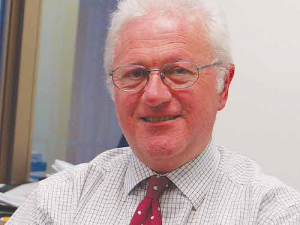MIA launches 2026 Red Meat Sector Dragon’s Den for innovative ideas
The Meat Industry Association (MIA) is once again looking for game-changing ideas for New Zealand's red meat processing and exporting sector.
 MIA’s Tim Ritchie says demand is increasing for high quality, safe blood products for pharmaceutical use.
MIA’s Tim Ritchie says demand is increasing for high quality, safe blood products for pharmaceutical use.
The ability to send blood products and serum to China is “absolutely” important, says Tim Ritchie, Meat Industry Association (MIA) chief executive.
“The whole business model is about taking everything you can from an animal,” he told Rural News.
“Anything of any value is extracted and monetarised and that enables you to look after the farmer and hopefully make a profit. You’ve got the meat component and you’ve got the whole of the 'fifth quarter' -- the wool, pelt, skin, offal, edible and inedible, the rendering products.
“Blood in the old days would have gone down the rendering shoot and been made into blood and bone.
“Clearly there is an opportunity to not let it go down the shoot, catch it and use it in some higher value areas.”
His comments follow the announcement last month by Primary Industries Minister Nathan Guy that China has approved formal access for New Zealand bovine blood products into the Chinese market. Access has been approved by the General Administration of Quality Supervision, Inspection and Quarantine of the People's Republic of China (AQSIQ) for NZ premises to export bovine blood products such as bovine protein and serum to China.
Ritchie says demand is increasing for high quality safe blood products for pharmaceutical use.
“There is a real opportunity for NZ to capitalise on that. We had a relatively small trade in China which was suspended in 2015. The value of that trade was [in 2015] about $7 million for that year. Since then and now, with the regaining of access between the regulatory authorities here and over there, that will allow us to capitalise on increased demand which is clearly there for good quality product.
“The minister talked about potentially $50m value. I think we would fully support that based on information we have here from our members and those involved in that side of the business.”
And the value could be even more – up to $100m.
“It is something that will evolve and develop over the years ahead,” he says. “It will not evolve overnight. Having been suspended… it is a matter of our getting back in again and developing those relationships with the counter parties in that part of the world.
“It is a very positive move. If one can extract greater value out of a product than from it going down the shoot to be made into blood and bone meal, that is a net positive.
“In effect that will be the case because the people who will be collecting and selling it almost have to compete with the people doing the rendering so there almost has to be a better return. I am sure there will be value extracted and $50m is not an insignificant sum.”
Ritchie says it is in interests of people both sides of the farmgate to ensure one another's profit and viability.
“There is no future in an environment where one is capitalising at the expense of the other,” he says.
“For the long term both have to be in business and both have to be profitable by working together to try to make one and one equal three. If this is an opportunity to lift the value of a certain part of an animal, then ultimately that will find its way back to the farmer because it is a competitive industry.
“It is a good news story for farmers, processors and meat exporters. It is a bit like the other recent progress we have made in that part of the world.
“Different markets have different needs. That is the beauty of being an export focused industry: we are not reliant on one market to buy everything.
“That agreement between NZ and the Chinese regulatory agency not only allows the business to resume but provides certainty for commerce that allows it to go ahead and develop those relationships and further develop the business with more certainty.
“Business is all about management of risk and by getting these agreements in place that removes some risk from the equation and allows the companies to go ahead and invest further."
Ritchie says Department of Statistics data doesn’t differentiate between blood of human or animal origin, but last year blood export products to Europe were about $92m and to the US $36m.
“How much is animal or human we don’t know. But presumably a good part would be animal,” he says.
The World Wide Sires National All Day Breeds Best Youth Camp Best All Rounder plaudit has become family affair, with 2026 Paramount Cup winner Holly Williams following in her sister Zara's footsteps.
DairyNZ is giving New Zealand farmers a unique opportunity to gain hands-on governance and leadership experience within the dairy sector.
Herd improvement company LIC has posted a 5.2% lift in half-year revenue, thanks to increasing demand for genetics.
According to the latest Fresh Produce Trend Report from United Fresh, 2026 will be a year where fruit and vegetables are shaped by cost pressures, rapid digital adoption, and a renewed focus on wellbeing at home.
The Roar is a highlight of the game hunting calendar in New Zealand, with thousands of hunters set to head for the hills to hunt male stags during March and April.
OPINION: The past few weeks have been tough on farms across the North Island: floods and storms have caused damage and disruption to families and businesses.

OPINION: Meanwhile, red blooded Northland politician Matua Shane Jones has provided one of the most telling quotes of the year…
OPINION: This old mutt has been around for a few years now and it seems these ‘once in 100-year’ weather…